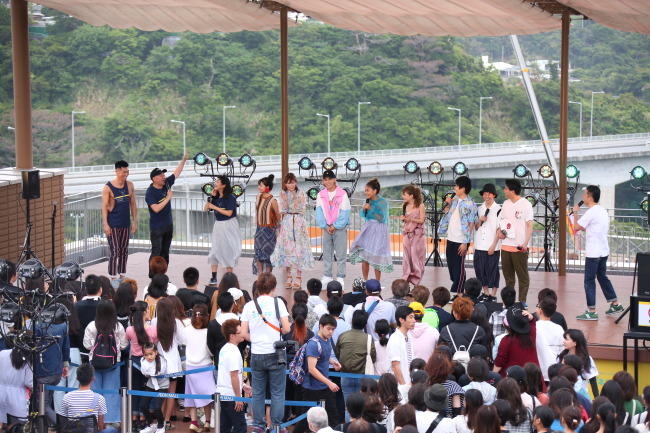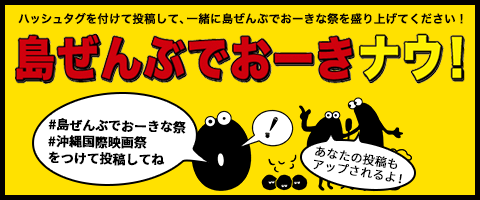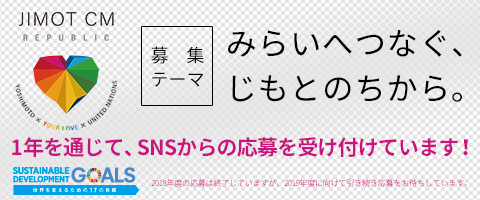Report2018.04.21OIMF 10 Daily Report 3: Saturday April 21
Saturday April 21st, the third day of 10th Okinawa International Movie Festival, started out with an informative presentation on the Sustainable Development Goals (SDGs) the UN has established and Yoshimoto Kogyo has been working on for the past few years.
Jeffrey A. Brez, a United Nations official in charge of NGO relations, is attending the festival to spread the word about SDGs. “193 member nations had to agree on these 17 goals, and that was a big achievement,” Brez explained at the seminar in the morning of the 21st at the Hyatt Regency Hotel in Naha. He added, “there was a two-year period in which businesses and general society provided feedback. All of the 17 goals are achievable, but ambitious. Can we end hunger? Yes, there is enough food for everyone.”
Also presenting at the seminar was Kaoru Nemoto, Director of the United Nations Information Centre in Tokyo, who explained how a movie festival got involved in a UN program. “The United Nations is not necessarily a good storyteller, but entertainers are very good at relating to people through laughter,” she explained. “So I made a plea to Yoshimoto Kogyo to help us disseminate the message about SDGs. The first promotion we did was this festival last year, when public recognition of SDGs in Japan was almost zero. But a recent survey shows recognition has risen to about 15 percent.”
Next up for the day was Yoshimoto Kogyo’s conference on launching an entertainment industry hub in Okinawa. The company is making great efforts to create the hub in Okinawa, not only for Japan, but for Asia and the world. The conference took place at noon at the Laugh & Peace Entertainment School Okinawa. It outlined plans for what CEO Hiroshi Osaki calls an “Asian Entertainment Platform” that will, find and develop talent and create a way to share content.
“We lost the 20th Century to the United States, because Hollywood succeeded in producing and distributing movies cheaply,” Osaki said. “And we are losing the 21st Century, because we do not have enough Japanese content.” But he does have a plan to change that.
Osaki explained that the new platform is not ready to be launched, but he wanted to take the opportunity to speak about it at the 10th Okinawa International Movie Festival. Yoshimoto Kogyo is working with two other companies on the project. Transcosmos Co. will help with the digital construction of the platform, while cyber-security firm Blue Planet-works will make sure content cannot be pirated.
Content will be delivered in a wide variety of formats. “We want to make things like TV shows, but not quite like the shows on TV,” Osaki said. The range will not be limited to films and series, but will include music, comic books, games, social media and virtual reality. Monetization will also take many forms, including subscriptions, pay as you go, ads and even tipping content creators.
Another facet of the 10th Okinawa International Movie Festival is the commercial contest “Jimot CM Republic,” which features 30-second videos built around one of the 17 United Nations Sustainable Development Goals.
Anyone could participate simply by putting a video online with the hashtag #JIMOTCM. Submissions were separated into three categories: 41 towns and villages of Okinawa, the other 46 prefectures of Japan, and the rest of the world.
The finalists were screened at an award ceremony on Saturday at Naminoue Umisora Park. Jeffrey A. Brez served as one of the judges. “I want you to believe that SDGs are really achievable,” Brez told the audience. “I hope you will feel that as we watch these commercials together.” Kaoru Nemoto, Director of the United Nations Information Centre in Tokyo said “this contest is just one of the efforts to raise awareness of SDGs that started at the festival last year, and we plan to continue till the year 2030.”
Finally, on Saturday evening people poured into a theater at the Mihama 7-plex in Chatan town, Okinawa, for the Japan Premiere of the stunning film Born Bone Bone (called Senkotsu in Japanese). This feature film by director Toshiyuki Teruya is based on his short film, which picked up awards at the Short Shorts Film Festival and the Skip City International D-Cinema Festival, both in Japan. This feature has been invited to screen at the 40th Moscow International Film Festival later this month and is a monumentally powerful work.
It depicts the ancient Okinawan ritual of washing the bones of the deceased on the 4th anniversary of their death to send the departed off to the next world. The film effectively draws the nexus between life and death using the living tradition of bone washing, which used to be common throughout Okinawa but is now confined to a few islands.

Recently News
-
- 2018.04.22
- Announcement of the result of the 10th Okinawa International Movie Festival
-
- 2018.04.22
- The Award Winners of the 10th Okinawa International Movie Festival
-
- 2018.04.22
- 10th OIMF All Ending Concert
-
- 2018.04.22
- 10th OIMF Comes to a Close
-
- 2018.04.22
- New Innovations to the 10th Okinawa Movie Festival











